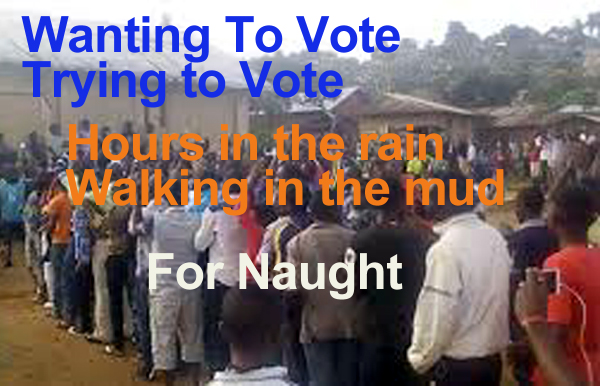 The initial outcome of the Congo (DRC) election is no surprise. The possibility of civil war has increased. But there was a tragic surprise and it’s with CNN and the Washington Post grossly misreporting what happened.
The initial outcome of the Congo (DRC) election is no surprise. The possibility of civil war has increased. But there was a tragic surprise and it’s with CNN and the Washington Post grossly misreporting what happened.
Take note, progressives. Two major news media that you love reported out a positive story of an actually miserably negative one. They missed easy and essential elements that have been fully reported by British and European news outlets, and pretty well by the New York Times and NPR. Here’s what’s happened and what was so badly reported:
The Congo is a bad political conscript of the colonial era. It’s a huge, mostly impenetrable jungle that separates two densely populated and very different societies that have been at each other’s throats since the get go. As political power coalesced in the western part, the eastern part with its monopoly on rare natural resources grew chaotic and ungovernable. In recent times this is where Africa’s most atrocious and cruel fighting has been.
Never the twain shall meet has been my conclusion for decades. And whether it was the U.S. and Belgium during the Cold War, or high tech companies vying for the east’s rare earths at all sorts of immoral costs, the poor place has never had a square deal. It’s been bantered between western pontificating about righteous governance and world mafia support for child labor and abuse in return for necessary cell phone innards.
It’s a mess. There’s never been a real election. I don’t think there could be. All the few leaders in the last half century have been dictators who arrived by coup or were installed by fretting western powers.
The current leader, Joseph Kabila, was to have stepped down years ago according to the country’s original constitution. One problem was that he seemed to have a trouble picking a successor. In a well-run dictatorship that’s not a problem. In the DRC it is.
Leadership circles in the DRC are very tight. In terms of policy there’s very little disagreement among all the major political players, because they’ve all come from the same house. Their parents all maneuvered and served together. They might appear as opponents on an election ballot but they’re school chums who divvied up foreign aid in a secret tree house.
When a rare outsider appears in Congolese politics, younger Congolese explode with joy, and that was exactly the case with Martin Fayulu.
Fayulu is a slightly younger, businessman who had never been in politics. He spent much of his life outside the Congo being educated in France and the U.S. and then joined a series of oil companies as a top accountant. He was considered so good that he quickly percolated up the ranks of companies like Mobil where he ran the multinational oil operations in several different African countries.
During one of the more serious crises involving the current president, Kabila, a bonafide progressive political group in The Congo, the UDPS, recruited Fayulu to contest a presidential election whenever it might be allowed.
Fayulu stepped up to the task and irritated virtually every established politician in the country. After all, these “election squabbles” reported out to the wider world are really little more than house tiffs between competitive siblings. Fayulu posed a real threat to palace power.
The Congo establishment might control the reigns and levers of power, but they can’t control private polling that is often accomplished today across national borders using social media. There’s no question that in a free and fair election, Fayulu would win.
Kabila’s own party candidate was a disaster. Although the election commission is expected to take a long time counting votes in this political maize of a sort-of-country, it went on for weeks. In the end Kabila’s pick was given 4% of the votes, but Fayulu didn’t win. Another dark horse theoretical opponent, Felix Tshisekedi, just barely edged him out. Can you imagine that?
Tshisekedi is to Kabila like Romney is to Trump. There’s no way he could have won more votes than Fayulu. Alas, the civil war begins.
But not according to CNN or the Washington Post.
Both news outlets have reissued initial stories altering slightly their initial message that “the opposition won.” But the important story, the story of how the winner was literally “dealt” a blow with backroom contracts, is something you’ll only get well reading European media or African media.
The opposition didn’t win. What the rulers of The Congo call the “opposition” is still intricately connected to the chambers of the palace, and it’s clear that a deal was struck to keep Fayulu out. Even the Catholic Church has as much as said so.
I’m very concerned now with peace in The Congo, but I’m equally concerned with truth in America. This is not a time for equivocation. Only sharp truths will survive our current era of obfuscation.